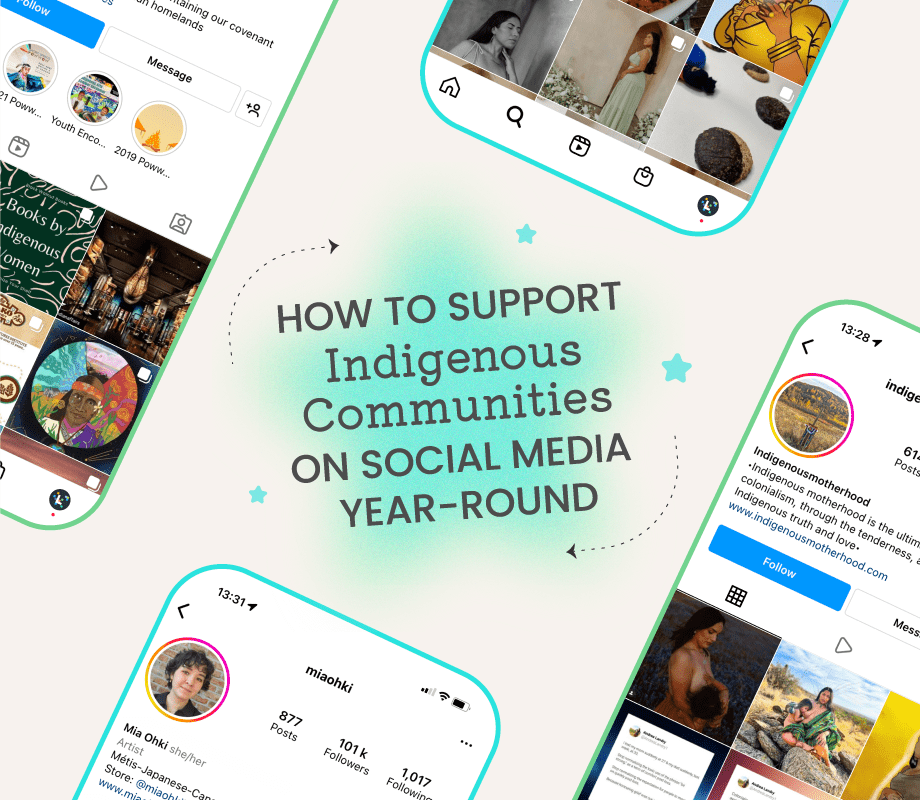02 Sep

How to Support Indigenous Communities on Social Media
Acknowledging Indigenous History Month (and Indigenous Peoples Day) on social media is a great first step, but it shouldn’t end there.
Here are four ways to continue that support year-round:
-
Unlearn and Learn Again
-
Support Indigenous-owned Businesses and Organizations
-
Amplify Indigenous Creatives, Artists, and Creators
-
Advocate for Change
#1: Unlearn and Learn Again
Indigenous communities are not a monolith. Unfortunately, many history books fail to address this and the diversity of traditions, cultures, and languages.
So, we have some unlearning and learning to do.
Here are a few resources to get started:
Watch
Read
Listen
Discover
#2: Support Indigenous-owned Businesses and Organizations
Indigenous Peoples carry an insurmountable amount of knowledge on conservation, sustainable food practices, climate change, and more.
By supporting Indigenous-owned businesses and organizations, you are supporting the livelihood of us all — present and future.
Here are three ways you can support Indigenous-owned businesses on social media:
-
Share their work and promote their business on your social channels.
-
Collaborate with them — whether it’s brand partnerships, exclusive products, or series content.
-
Invite Indigenous founders to speak on virtual panels, webinars, etc.
TIP: When partnering with a business or inviting a founder to speak at an event, remember to pay them for their time and expertise.
#3: Amplify Indigenous Creatives, Artists, and Creators
Brands and individuals alike can amplify the voices of Indigenous creatives, artists, and creators on social media.
Featured posts, Instagram Stories takeovers, and Instagram Lives are great for fostering awareness and passing the mic.
There are so many Indigenous voices you can learn from, work with, and support. Here are a few:
-
Indigenous Cultures Institute — A community organization dedicated to “preserving Indigenous cultures and maintaining our covenant with sacred sites.”
-
Jeffrey Gibson — An artist whose work has been featured across North America and abroad.
-
Josie Valadez Fraire — A creator, storyteller, and writer who shares knowledge about plant medicine, ancestral recipes, and more.
-
Kara Roselle Smith — A writer, model, and activist who uses her platform to talk about wellness, race, the environment, and more.
-
Indigenous Enterprise LLC — A dance troupe established in 2015 who’s comprised of talented dancers and singers from various parts of the US.
-
Mia Ohki — A Métis-Japanese-Canadian artist who’s been published in various outlets.
-
Shayla Oulette Stonechild — A founder, creator, and yoga instructor who amplifies Indigenous voices.
-
Charlie Amáyá Scott — An Indigenous creative and trans-femme who frequently advocates for the trans community and joy.
-
Aïcha Bastien-N’Diaye — A dance artist and content creator who amplifies the need for representation year-round.
TIP: Research local creatives in your city and allocate some of your marketing budget to partnering with them on a campaign.
#4: Advocate for Change
If you’re unsure where to start, check out the work of Land Rights Now. It is a human rights NGO that campaigns to secure community and Indigenous land rights everywhere.
You can also get involved with local organizations and initiatives — is there an opportunity for your business to donate your time, expertise, or monetary funds?
For a list of organizations to support, check out this list: 15 Indigenous Human Rights Organizations to Follow.
Your support is needed, appreciated, and encouraged.
Supporting Indigenous Peoples on social media (and elsewhere) is a lifelong journey, but even the smallest of changes, when multiplied, can make a big difference.
A quick reminder: Indigenous Peoples are here, have always been here, and will continue to be here. May we honor them always.
FYI: Later is a social media scheduling platform trusted by 4M+ brands and creators. Plan your posts in advance and publish them on Instagram, Twitter, Facebook, Pinterest, and LinkedIn — for free.
Source: later.com, originally published on 2022-06-08 11:42:27
Connect with B2 Web Studios
Get B2 news, tips and the latest trends on web, mobile and digital marketing
- Appleton/Green Bay (HQ): (920) 358-0305
- Las Vegas, NV (Satellite): (702) 659-7809
- Email Us: [email protected]

© Copyright 2002 – 2022 B2 Web Studios, a division of B2 Computing LLC. All rights reserved. All logos trademarks of their respective owners. Privacy Policy

![How to Successfully Use Social Media: A Small Business Guide for Beginners [Infographic]](https://b2webstudios.com/storage/2023/02/How-to-Successfully-Use-Social-Media-A-Small-Business-Guide-85x70.jpg)



![How to Successfully Use Social Media: A Small Business Guide for Beginners [Infographic]](https://b2webstudios.com/storage/2023/02/How-to-Successfully-Use-Social-Media-A-Small-Business-Guide-300x169.jpg)


Recent Comments